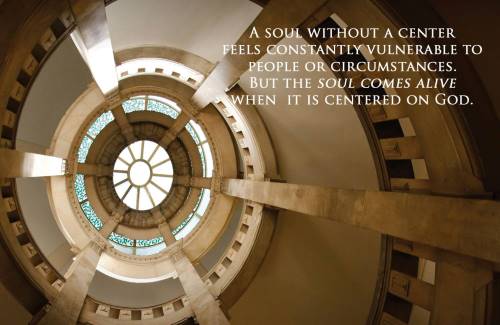Then Jesus said to his disciples, “Whoever wants to be my disciple must deny themselves and take up their cross and follow me. For whoever wants to save their life will lose it, but whoever loses their life for me will find it. What good will it be for someone to gain the whole world, yet forfeit their soul? Or what can anyone give in exchange for their soul?” – Matthew 16:25-26
What Is The Soul?
Your soul is the deepest thing about you. Jesus said that the soul is move valuable than the world. So why would we not value it? Two things are true: 1. You have a soul, 2. It is the only one you will ever have. – John Ortberg
As believers, we do not want to forfeit our souls. But what exactly is the soul? Can we identify it or describe it? Can we locate it in an x-ray? It would seem that something so important as the soul should be understood, protected, and nurtured.
In the new book and Bible study Soul Keeping: Caring for the Most Important Part of You, John Ortberg addresses the question: “What is the soul?” He begins with a comprehensive look at the soul as it is described throughout the scripture.
Watch the Trailer for Soul Keeping
Play Session One of Soul Keeping
As you watch, use the outline below to follow along or to take additional notes on anything that stands out to you.
Video Notes
The Parable of the Keeper of the Stream
Questions about the human soul:
- What is it?
- What does it consist of?
- Why does it matter, if it does matter? Is it doing okay?
All of us have an outer life and an inner life.
- My outer life is the public, visible me — my accomplishments, my work, my reputation.
- My inner life is largely invisible. It’s where my secret thoughts, hopes, and wishes live.
The self is not the soul.
- In the twentieth century, we replaced community, society, church, and faith with a tiny little unit that cannot bear the weight of meaning. We’ve replaced all these larger entities with the self.
- The self is a stand-alone, do-it-yourself unit, while the soul reminds us we are not made for ourselves or by ourselves. The soul always exists before God.
Your soul connects your thoughts, your sensations, your emotions, your will, and integrates them into an entire being.
The four parts of a human being: each part of a human being must be healthy and working as God intended it to, and that makes a healthy soul.
- Will: The innermost circle is the will — the capacity to choose . The will is what makes you a person and not a thing. It is important but it is also extremely limited.
- Mind: The second circle is the mind, a person’s thoughts and feelings. “The mind of the sinful [person] is death, but the mind controlled by the Spirit is life and peace” (Romans 8:6 NIV 1984).
- Body: The third circle is the body. “Our bodies are like our little power packs — we couldn’t be us without them . . . But they are not the whole story. We are not just the stuff that our bodies are made of” (Dallas Willard).
- Soul: The final circle is the soul. The human soul is what integrates all of our different parts into a single person.
“A healthy soul is an integrated soul, and an unhealthy soul is a ‘disintegrated’ one” (Dallas Willard).
- When we’re dealing with a disintegrated soul, we have to come to grips with sin.
- What does it mean to lose one’s soul?
- “What good will it be for someone to gain the whole world, yet forfeit their soul?” (Matthew 16:26)
- What Jesus is saying is a diagnostic expression. To lose my soul means I no longer have a healthy center that organizes and guides my life.
You have a soul, and for you to have a soul that is healed, that is healthy, that is redeemed by God, matters more than the outcome of any circumstance in your world or your life. Your eternal destiny rests on the well-being of your soul — and only God can heal the soul.
What does it mean to “keep” one’s soul?
- You have one soul; and gaining the whole world will not help you if you lose it.
- Caring for your soul, allowing it to flourish in God’s presence and become a gift to the world around you, is the primary charge that faces you before eternity.
- Your soul will live forever — and you are the keeper of your soul.
Study Questions
1. What part of the teaching had the most impact on you?
You Are the Keeper
2. A keeper is someone who is in charge of caring for, maintaining, or protecting something. For example, there are innkeepers, zookeepers, bookkeepers, groundskeepers, housekeepers, peacekeepers, shopkeepers, gatekeepers, beekeepers, etc.
- Along with the parable John told about the keeper of the stream, what do these images of keepers suggest about the tasks and characteristics of “keeping” in general? For example, the stream keeper’s work was described as “unseen.”
- What comes to mind when you think of these characteristics in connection with your soul? In other words, what might they reveal about what it means for you to engage in soul keeping?
Describing the Soul
3. It can be hard to define the soul, but sometimes we have moments when we recognize it even if we can’t define it. For example, John described feeling “an enormous combination of joy and humility and awe” when he watches a sunset at Big Sur, and how there is a depth to that experience that goes beyond what he can apprehend visually.
- Think back over the last day or two. In what moments did you catch a glimpse of your soul at work? (If nothing comes to mind, think back to the most recent experience you can recall.)
- How, specifically, do you recognize your soul in these moments? In other words, what distinguishes these moments from other moments?
- Overall, would you say you tend to be more aware of your soul in uplifting experiences (such as the one John described) or in experiences of hardship and suffering? Share the reasons for your response.
4. The Bible doesn’t provide a comprehensive definition of the soul, but the words biblical writers use offer insights about its meaning. In the Old Testament, the Hebrew word for the soul is nephesh (neh‘fesh) . New Testament writers use the Greek word psyche (psü-kha ̄’) to name the soul. The root words for both nephesh and psyche refer to “breath.”
Nephesh can be translated in several ways, but it is commonly renderedlife or soul. For example:
The ransom for a life [nephesh] is costly, no payment is ever enough. (Psalm 49:8)
Only take care, and keep your soul [nephesh] diligently. (Deuteronomy 4:9a ESV)
Psyche is also frequently translated as life or soul. We see both uses in this statement made by Jesus:
For whoever wants to save their life [psyche] will lose it, but whoever loses their life [psyche] for me will find it. What good will it be for someone to gain the whole world, yet forfeit their soul [psyche]? Or what can anyone give in exchange for their soul [psyche]? (Matthew 16:25-26)
In biblical usage, nephesh and psyche are words that encompass all that makes a person a living being, “summing up . . . the whole personality, of the whole self of a person.” In essence, they are words that refer to your life as an integrated whole and all the components that make you uniquely you.
- Briefly reflect on the soul using the image of breath, the meaning of the biblical root words. For example, you might consider when you tend to be most and least aware of your physical breathing, what takes your breath away, or what makes you hold your breath. What parallels do you recognize between these physical experiences of breath and the ways in which you might experience, or fail to experience, your soul at work?
- The three Scriptures quoted above stress the incalculable value of the soul and the importance of making an intentional effort to care for it. And yet, as Dallas Willard acknowledged, even among Christians, “very few people [are] seriously concerned about the state of their own soul.” Overall, how would you assess yourself in this regard? For example, would you say the attention and care you give to the state of your soul right now is the highest it’s ever been, the lowest, or somewhere between? Share the reasons for your response.
Caring for the Soul
5. John described a distinction Dallas Willard made between being busy and being hurried:
Hurry is the great enemy of souls in our day. Being busy is mostly a condition of our outer world; it is having many things to do. Being hurried is a problem of the soul. It’s being so preoccupied with myself and what myself has to do that I am no longer able to be fully present with God and fully present with you. There is no way a soul can thrive when it is hurried.
- How would you assess the threat level of hurry to your soul right now? Is it very high, moderate, or low?
- When are you most likely to succumb to hurry — to lose the ability to be fully present with God and others?
- If you were to describe the characteristics of a person who is busy but not hurried, what would they be? For example, what would you expect to notice about their demeanor, their actions, and their interactions with others?
Your Turn
John said that this was the most important thing he had to say:
You have a soul, and for you to have a soul that is healed, that is healthy, that is redeemed by God, matters more than the outcome of any circumstance in your world or your life. Your eternal destiny rests on the well-being of your soul — and only God can heal the soul.
In what ways might the next twenty-four hours be different if you were to take this statement seriously? For example, how might it influence the decisions you make, the way you spend your time, or the way you relate to others?
You’re invited to leave your comments on this week’s blog!
* Excerpted with permission from Soul Keeping: Caring for the Most Important Part of You study guide by John Ortberg, copyright 2014 Zondervan.








